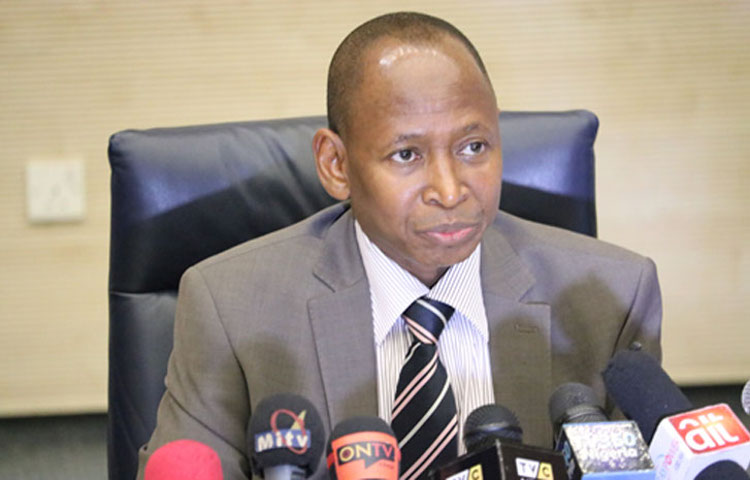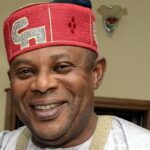The arrest of the Accountant General of the Federation (AGF), Mr Ahmed Idris, by the Economic and Financial Crimes Commission (EFCC) last week is simply one of the most shocking revelations of alleged corruption in Nigeria, a country where allegation of corruption against top officials of government is routine news. According to the EFCC, Mr Idris was arrested in connection with alleged diversion of funds and money laundering activities to the tune of N80 billion. The anti-corruption agency said its “verified intelligence showed that the AGF raked off the funds through bogus consultancies and other illegal activities, using proxies, family members and close associates… about 17 houses in London, Lagos, Kano, Abuja and Dubai have been traced to him. In Abuja, some of the houses are located in serviced estates”.
In no small measure, the alleged fraud by Mr Idris is both literally and symbolically a big blow to the administration. Upon assumption of office as president in 2015, Buhari appointed Mr Idris among the first set of top bureaucrats to drive the new democratic government’s agenda. Mr Idris’ appointment, made on June 25, 2015, was way ahead of those of ministers, ostensibly because he was to pilot the transparency and accountability agenda of the administration.
- B/Haram kills 2 policemen, injures 5 in Borno ambush
- Runsewe links insecurity to youths’ emulation of western culture
The three main wheels for the achievement this agenda, the Treasury Single Account (TSA), the Integrated Payroll and Personnel Information System(IPPIS), and the Financial Management Information System (FMIS), are domiciled in the Accountant-General’s office. They are meant to support the automation and integration of public financial management processes, to control treasury operations, transparent accounting and reporting system. It is, therefore, disturbing that the same man vested with this all-important responsibilities, has been caught with soiled fingers. His case is more disappointing because, he is accused of stealing such a stupendous amount, N80 billion, literally 40 times more than the alleged N2 billion fraud for which the EFCC dragged his predecessor, Jonah Ogunniyi Otunla, before the Federal High Court in Abuja in 2017.
For Nigeria, it is bad enough that a former Accountant-General of the Federation (Otunla) was quickly arraigned alongside eight others on a five-count charge of fraud. It is unspeakable to have his sitting successor arrested for allegedly committing 40 times more fraud. The duties of the AGF are meant to frustrate or forestall corruption. The AGF serves as “the Chief Accounting Officer of the receipts and payments of the government of the federation; supervises the accounts of federal ministries and Extra-ministerial offices and other arms of government,” among several others.
Ethically, therefore, the AGF should not be the candidate to engage in this kind of fraud. But beyond that, it is unbelievable that the fraud was committed under the nose of the anti-corrupt desk at the AGF’s office. Why was it difficult for the personnel of anti-corruption agencies posted to government offices to track those corrupt activities and report to their headquarters? Worse still, every four years, top government officials are meant to declare their assets at the Code of Conduct Bureau (CCB). Why did the CCB fail to detect the acquisition of these properties by Mr Idris, even if they were through proxies?
From the EFCC’s preliminary investigations, it can be deduced that some of the phony consultancies used as conduit pipes for stealing the N80 billion were built into the country’s budgets over the years. If so, then issues raised by the media and civil society organisations about frivolous, duplicated and suspicious line items in the country’s budgets, if dealt with, would have prevented this monumental fraud. Moreover, Nigerian now recall, with a hint of sad irony, that Mr Idris dismissed allegations of inherent corruption in the implementation of IPPIS, the kind of corruption that enables those at the back-end of the technology to siphon funds from the system. It is clear that riding on absolute trust from the president and standing on the enormous constitutional powers he has, Mr Idris has allegedly stolen the country blind.
The alleged N80 billion fraud may be a tip of the iceberg, as there could be bigger corrupt and money laundering activities still hidden from the public. We call on the EFCC to dig deeper, and if necessary, engage the services of digital and forensic accounting experts to track any frauds. But before then, all those who participated in this alleged fraudulent act must be rounded up. This case must not be swept under the carpet, like several other corruption cases. It must be prosecuted to the logical conclusion and its findings must be made public.

 Join Daily Trust WhatsApp Community For Quick Access To News and Happenings Around You.
Join Daily Trust WhatsApp Community For Quick Access To News and Happenings Around You.
